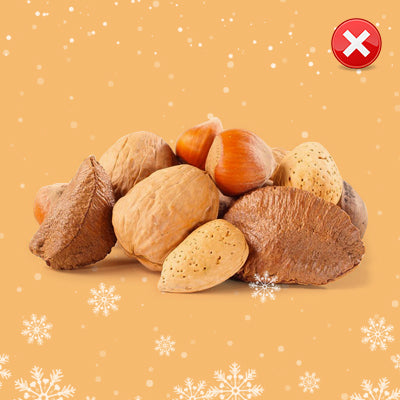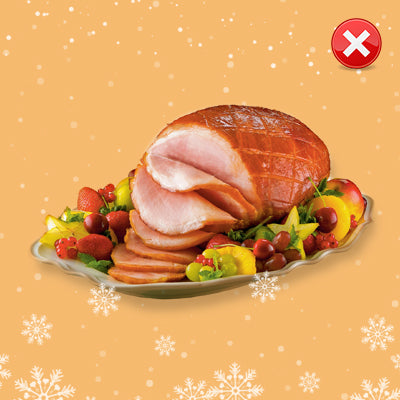
Common Holiday Foods You Should Never Give Your Pets
October 18, 2021 4 min read
In the spirit of Thanksgiving, Hanukkah, Christmas, or New Year Eve, it’s natural to want to include our favorite fur babies in the holiday meals and give them a taste of the delicious dishes that have been cooked for hours. However, sharing your meal can have unexpected consequences. There are plenty of foods that can be poisonous to pets, and you certainly don't want your pets throwing up during a Christmas party (or any time for that matter).
Here’s a handy guide on foods to avoid feeding your furry family members during the holiday season.
1. Chocolate

Although we all know that pets should not be eating chocolate in any of its forms, it’s still one of the most common causes of pet poisoning. Chocolate is toxic to dogs and cats mostly because it contains theobromine and caffeine. Just a little bit of chocolate can cause diarrhea and vomiting, while a large amount of chocolate can result in seizures, tremors, heart attack and internal bleeding. This holiday, be sure to keep your chocolate out of reach of pets.
2. Nuts

Not all nuts are toxic to dogs, but most nuts are high in fat, which can cause stomach upset, obesity, or other severe health issues. Feeding your dogs salted nuts can also result in water retention and other serious reactions, while some nuts, such as almonds, walnuts, macadamia nuts, are potential choking hazards.
3. Alcohol

Because of their smaller size, dogs and cats are more susceptible to the effects of alcohol than humans. Even a small amount of alcoholic beverages and food products containing alcohol could cause drops in blood sugar, blood pressure, and body temperature, and they can even experience difficulty breathing. Holiday dishes can often contain alcohol, so be sure to keep them out of reach of your pets.
4. Raisins and Grapes

Chocolate and alcohol may not be a surprise, but a lot of us don’t know that raisins and grapes are poisonous to animals. Ingesting just a small amount of these foods can cause kidney failure or worse. Vomiting and hyperactivity are the initial signs of poisoning. So, it’s important to keep any desserts, fruitcakes, or holiday fruit baskets in a place safe from pets.
5. Poultry Bones

Who doesn’t love giving a dog a bone? However, don’t give your pets cooked bones, as they lose their moisture and become brittle. If your pet eats them, they can break off and get stuck in his stomach or throat – causing severe injuries. So, it’s best to dispose of them safely when you’ve finished eating and just stick to toys for your dogs or cats.
6. Turkey Skin

Holiday foods such as turkey skin and gravy are difficult for pets to digest due to their high-fat content. The fat content can cause pancreatitis, and the seasonings can irritate your dog’s stomach. Your pet’s pancreas can even become inflamed, leading to pancreatitis - a very serious disease. Skip the skin and make sure you only feed your furry pals turkey meat.
7. Onions and Garlic

All members of the onion family or closely related (shallots, garlic, scallions, etc.) contain sulfites, which are toxic to dogs and cats. Consuming only a small amount can result in damaged blood cells and hemolytic anemia. You may not feed your pets these foods directly, but remember to check ingredients carefully before letting your pets eat something you suspect may contain either.
8. Yeasty Doughs

Don't spoil your pets’ holiday by giving them raw dinner rolls, because they can expand inside their stomach and lead to vomiting, dangerous stomach distension and bloating, which could become a life-threatening emergency, requiring surgery. Besides, the fermenting yeast releases alcohol, which we already know is not good for them.
9. Milk Products

Milk, cream, cheese, and butter are bad both for humans and dogs. Because pets can’t digest large amounts of lactase (the enzyme that breaks down lactose in milk), milk and other dairy products can lead to diarrhea or other digestive issues. During the holidays, pay attention to limiting the amount of dairy products your pets consume as part of other foods you may give them.
10. Ham and Bacon

Like cheese, ham, bacon or meat trimmings are very high in fat, which can cause life-threatening pancreatitis. Also, as these foods contain a significant amount of salt, they can upset the stomach and, in extreme cases, can cause dogs and cats to drink too much water, resulting in bloating, which can be potentially fatal. So, no more bacon, bacon grease, or other salty, fatty holiday treats!
If you’re looking for holiday personalized gift ideas, be sure to check out all our gift collections here:
Wrapping Up
The Christmas holiday season is a time of sharing and goodwill, so print this story and stick it to your fridge to remind your guests and family with dangerous holiday treats they shouldn’t spoil the pets at this time of year. If you don't know what you should do if your pets eat something they shouldn't, give the ASPCA Animal Poison Control Center a call at this number: 888-426-4435.
Just keep an eye on who’s eating what, and you and your fur babies are sure to enjoy a happy and merry holiday season!
